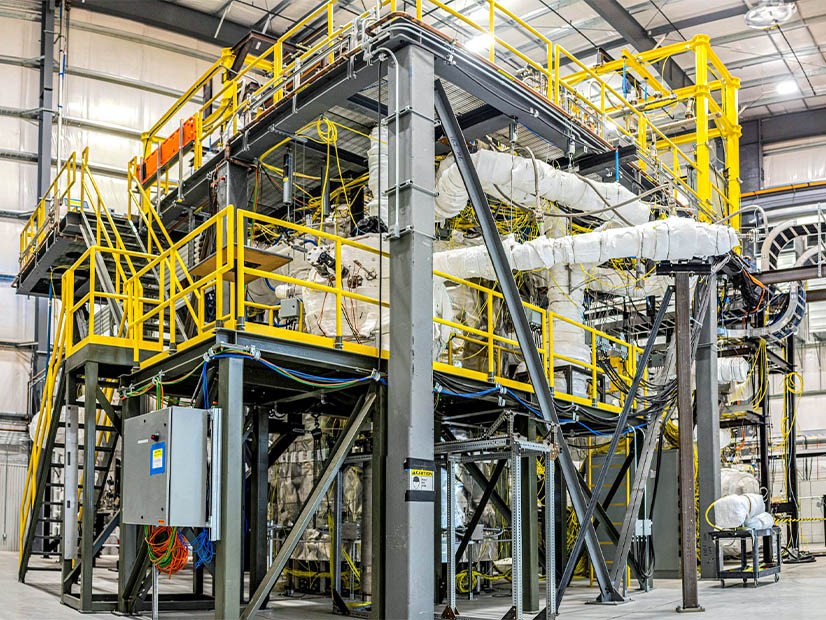
Kairos Power and Google have reached a first-of-its-kind power purchase agreement involving several units of the small modular reactor Kairos is developing.
The two companies announced Oct. 14 that Kairos would deploy the first of its small molten-salt reactors for Google’s benefit by 2030 and a fleet totaling 500 MW by 2035.
Google said the power purchase agreements are part of its larger effort to develop and commercialize advanced clean electricity technologies to run its offices and energy-intensive data centers.
Kairos said the deal will support the iterative process through which it is pursuing its first commercial deployments, with each reactor contributing learnings that will optimize subsequent plants.
This year, California-based Kairos began construction of a low-power demonstration version of its reactor design at Oak Ridge, Tenn.
It is the first non-light-water reactor permitted for construction in the United States in more than half a century. The U.S. Department of Energy will invest up to $303 million to support construction and commissioning of the reactor, which is expected to be operational by 2027.
Many companies have committed to renewable energy or signed purchase agreements for new generation. One of the largest such consumers is Google, which has signed more than 100 agreements totaling over 14 GW since 2010.
A few companies have begun negotiating supply agreements with operators of existing nuclear plants, eager for the reliable flow of zero-emissions electricity they can supply.
The Google-Kairos deal is on a different level, pinned on a developing technology long on promise but short on operational experience.
Advanced nuclear technology is gaining increasingly broad support as a potential solution to the dual need to produce electricity with less environmental impact. Small modular reactors (SMRs) add the tantalizing prospect of faster, more nimble, less expensive deployment.
SMRs potentially could be collocated with a large power user as a behind-the-meter power source and avoid the costs and delays that accompany grid interconnection.
However, SMRs still must complete their development cycles and emerge in a form that is affordable and commercially scalable, and will pass muster with regulators, investors and host communities.
The Google-Kairos announcement did not specify a price tag or location for the reactors.
Large-scale nuclear power has become extremely expensive to build in the United States, in part because so few reactors have been built in the past three decades.
If each project is a “first-of-a-kind,” or first-in-a decade, it is hard to develop the economies of scale and institutional knowledge that would be expected to benefit an “nth-of-a-kind” project.
The Department of Energy addressed the differences between FOAK and NOAK in the September update of its “Pathways to Commercial Liftoff: Advanced Nuclear” report. There are more than 50 unique designs among the 94 operating commercial reactors in the United States, almost all of which came online before 1990.
The report indicates SMRs are likely to cost more per MW to build than large reactors and have smaller overall price tags.
It flags the potential to achieve what Kairos is attempting to accomplish with its iterative development approach and vertical integration: “An SMR could complete FOAK construction and implement cost-saving learnings on the second-of-a-kind reactor.”
In a news release, Kairos CEO Mike Laufer said the agreement will help propel the company he co-founded in 2016:
“Our partnership with Google will enable Kairos Power to quickly advance down the learning curve as we drive toward cost and schedule certainty for our commercial product. By coming alongside in the development phase, Google is more than just a customer. They are a partner who deeply understands our innovative approach and the potential it can deliver.”
In its announcement, Google said its power procurement from multiple reactors will help Kairos bring costs down and speed up development and is part of a broader effort Google is making with other advanced energy technologies.
Kairos is designing a low-pressure, high-temperature reactor that will operate with molten fluoride salt heated to 650 degrees Celsius. Its KP-X demonstrator will be a single unit rated at 50 MWE, and the KP-FHR commercial version will be dual units rated at 75 MWE each.
They are sized to ease manufacturing and construction of components.



